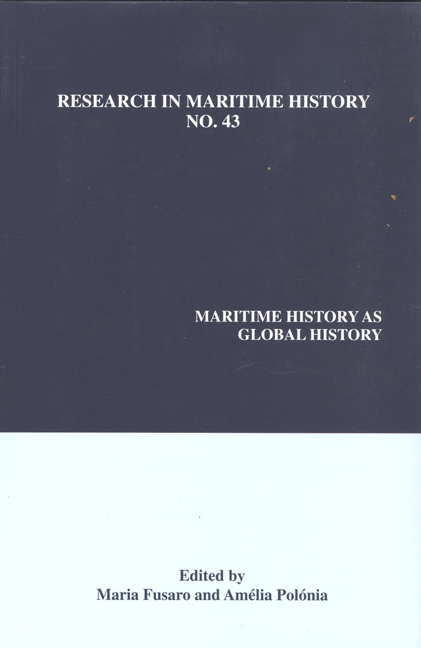Book contents
- Frontmatter
- Contents
- About the Editors
- Contributors' Notes
- “Maritime History: A Gateway to Global History?”
- “Behind the Atlantic Expansion: Flemish Trade Connections of Seville in 1620”
- “National and International Labour Markets for Sailors in European, Atlantic and Asian Waters, 1600-1850”
- “Maritime Expansion and (De)globalization? An Examination of the Land and Sea Trade in Seventeenth-Century Mughal India”
- “From Hold to Foredeck: Slave Professions in the Maritime World of the East India Company, c. 1660-1720”
- “Small Town Merchants, Global Ventures: The Maritime Trade of the New Julfan Armenians in the Seventeenth and Eighteenth Centuries”
- “Lighting up the World? Empires and Islanders in the Pacific Whaling Industry, 1790-1860”
- “Technological Advances in the Maritime Sector: Some Implications for Trade, Modernization and the Process of Globalization in the Nineteenth Century”
- “Lost in Calculation? Norwegian Merchant Shipping in Asia, 1870-1914”
- “Why Are the Major Oil Companies Selling Off their Fleets? The Case of Total”
- “Turning Maritime History into Global History: Some Conclusions from the Impact of Globalization in Early Modern Spain”
- “Maritime History as Global History? The Methodological Challenges and a Future Research Agenda”
“Turning Maritime History into Global History: Some Conclusions from the Impact of Globalization in Early Modern Spain”
- Frontmatter
- Contents
- About the Editors
- Contributors' Notes
- “Maritime History: A Gateway to Global History?”
- “Behind the Atlantic Expansion: Flemish Trade Connections of Seville in 1620”
- “National and International Labour Markets for Sailors in European, Atlantic and Asian Waters, 1600-1850”
- “Maritime Expansion and (De)globalization? An Examination of the Land and Sea Trade in Seventeenth-Century Mughal India”
- “From Hold to Foredeck: Slave Professions in the Maritime World of the East India Company, c. 1660-1720”
- “Small Town Merchants, Global Ventures: The Maritime Trade of the New Julfan Armenians in the Seventeenth and Eighteenth Centuries”
- “Lighting up the World? Empires and Islanders in the Pacific Whaling Industry, 1790-1860”
- “Technological Advances in the Maritime Sector: Some Implications for Trade, Modernization and the Process of Globalization in the Nineteenth Century”
- “Lost in Calculation? Norwegian Merchant Shipping in Asia, 1870-1914”
- “Why Are the Major Oil Companies Selling Off their Fleets? The Case of Total”
- “Turning Maritime History into Global History: Some Conclusions from the Impact of Globalization in Early Modern Spain”
- “Maritime History as Global History? The Methodological Challenges and a Future Research Agenda”
Summary
History as a discipline is as liable to fall for fashions and fads as any other. An occasional critical appraisal of new strands of history, such as the one undertaken in this volume, is therefore an important part of scholarly debate. In recent years, the two trends in history that are arguably most important from the point of view of maritime historians are Atlantic history and global history. This essay will not address the increasing historiography dealing with transatlantic connections predominantly – though not exclusively – in the Anglophone and African context. I would argue, however, that some of the discussion of how global history challenges maritime historians could also be applied to Atlantic history. This article will start by trying to define more clearly what global history is, how it has been analyzed and to what extent it can provide useful interpretative and methodological contributions to maritime history. It will then elaborate very briefly on a few examples from the field of Spanish maritime history to illustrate the kinds of challenges that I believe it contains.
The argument I wish to develop can be summarized as follows. First, global history is not about the spatial scale of enquiry. Instead, it implies a methodological and theoretical shift that can enrich historical enquiry at any geographical level. Second, this shift can be an important corrective to the way maritime historians have thus far conceptualized the process of globalization. I argue that a methodological and definitional bias in maritime history has led towards a prioritization of technology as a potential prime mover of maritime expansion. A re-definition of globalization as a historically contingent process of connections and interactions that are revealed mostly through a comparative approach shows the limitations of technology-focused maritime history. Third, it also requires us to rethink notions of when globalization began and how it proceeded. Eventually, though, this opens up a set of new avenues for maritime history that would be a shame to miss out on.
I
Quite a few maritime historians feel awkward about the rise of global history. This volume demonstrates at the same time the need to assess the potential usefulness of this new historiography for maritime history, as well as the fact that maritime historians are still not entirely sure what to do with it. In part this is because maritime history has always been global.
- Type
- Chapter
- Information
- Maritime History as Global History , pp. 249 - 266Publisher: Liverpool University PressPrint publication year: 2010



